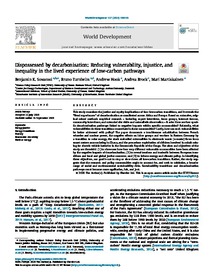Dispossessed by decarbonisation: reducing vulnerability, injustice, and inequality in the lived experience of low-carbon pathways

Sovacool, Benjamin K. ; Turnheim, Bruno ; Hook, Andrew ; Brock, Andrea ; Martiskainen, Mari
2021
137
January
1-14
climate change ; energy policy ; renewable resources ; poverty ; labour movement ; decarbonization ; social inequality
Energy
https://doi.org/10.1016/j.worlddev.2020.105116
English
Bibliogr.
"This study examines the justice and equity implications of four low-carbon transitions, and it reveals the “lived experiences” of decarbonisation as manifested across Africa and Europe. Based on extensive, original mixed methods empirical research – including expert interviews, focus groups, internet forums, community interviews, and extended site visits and naturalistic observation – it asks: How are four specific decarbonisation pathways linked to negative impacts within specific communities? Relatedly, what vulnerabilities do these transitions exacerbate in these communities? Lastly, how can such vulnerabilities be better addressed with policy? The paper documents a troublesome cohabitation between French wineries and nuclear power, the negative effects on labor groups and workers in Eastern Germany by a transition to solar energy, the stark embodied externalities in electronic waste (e-waste) flows from smart meters accumulating in Ghana, and the precarious exploitation of children involved in cobalt mining for electric vehicle batteries in the Democratic Republic of the Congo. The aims and objectives of the study are threefold: (1) to showcase how four very different vulnerable communities have been affected by the negative impacts of decarbonisation; (2) to reveal tensions and tradeoffs between European transitions and local and global justice concerns; and (3) to inform energy and climate policy. In identifying these objectives, our goal is not to stop or slow down all low-carbon transitions. Rather, the study suggests that the research and policy communities ought to account for, and seek to minimize, a broader range of social and environmental sustainability risks. Sustainability transitions and decarbonisation pathways must become more egalitarian, fair, and just."
Digital
The ETUI is co-funded by the European Union. Views and opinions expressed are however those of the author(s) only and do not necessarily reflect those of the European Union or the ETUI.